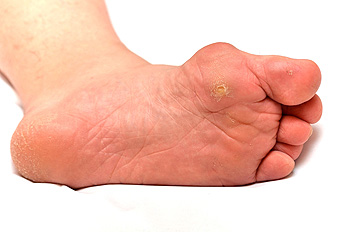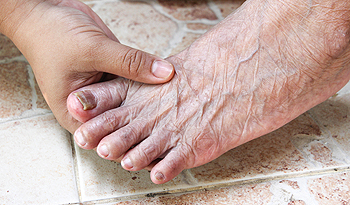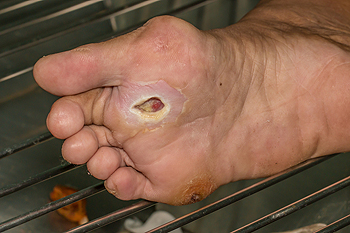 If you have a growth on the bottom of the big toe that appears to be of a bony consistency, you may have what is referred to as a bunion. Symptoms of this condition may consist of pain and swelling around the big toe, in addition to the area feeling sore, and appearing red. They are often caused by a predisposed inherited gene. Additionally, choosing to wear shoes that fit poorly may be another possible cause of bunions. This condition may be more prevalent in women than men because of the type of shoes that are worn. This may occur if high heels are worn frequently, causing the toes to be cramped into a small area, which eventually may change the structure of the foot. Treatment options may include using bunion pads which will cushion the affected area, and may possibly eliminate any discomfort. A consultation with a podiatrist may be considered to discuss proper treatment techniques which may include surgery.
If you have a growth on the bottom of the big toe that appears to be of a bony consistency, you may have what is referred to as a bunion. Symptoms of this condition may consist of pain and swelling around the big toe, in addition to the area feeling sore, and appearing red. They are often caused by a predisposed inherited gene. Additionally, choosing to wear shoes that fit poorly may be another possible cause of bunions. This condition may be more prevalent in women than men because of the type of shoes that are worn. This may occur if high heels are worn frequently, causing the toes to be cramped into a small area, which eventually may change the structure of the foot. Treatment options may include using bunion pads which will cushion the affected area, and may possibly eliminate any discomfort. A consultation with a podiatrist may be considered to discuss proper treatment techniques which may include surgery.
If you are suffering from bunions, contact Brent Harwood, DPM of Southeast Podiatry. Our doctor can provide the care you need to keep you pain-free and on your feet.
What Is a Bunion?
A bunion is formed of swollen tissue or an enlargement of boney growth, usually located at the base joint of the toe that connects to the foot. The swelling occurs due to the bones in the big toe shifting inward, which impacts the other toes of the foot. This causes the area around the base of the big toe to become inflamed and painful.
Why Do Bunions Form?
Genetics – Susceptibility to bunions are often hereditary
Stress on the feet – Poorly fitted and uncomfortable footwear that places stress on feet, such as heels, can worsen existing bunions
How Are Bunions Diagnosed?
Doctors often perform two tests – blood tests and x-rays – when trying to diagnose bunions, especially in the early stages of development. Blood tests help determine if the foot pain is being caused by something else, such as arthritis, while x-rays provide a clear picture of your bone structure to your doctor.
How Are Bunions Treated?
If you have any questions, please feel free to contact one of our offices located in Fairhope, Brewton, and Atmore, AL . We offer the newest diagnostic and treatment technologies for all your foot care needs.
Read more about Bunions White or yellow toenails is often indicative of a toenail fungus. Severe fungal infections can cause thickening of the nail, and even cause it to crumble and fall off the toe. If the feet are prone to excessive sweating, the chances may be increased for developing a toenail fungus. Additionally, this condition is contagious, and is often spread by walking barefoot in public places such as on shower floors and around community pools. Treatment remedies that may aid in helping the foot to feel better may include using a foot powder designed to eliminate moisture. Choosing to change socks often and keeping the toenails dry and trimmed will help the toes to feel better. A consultation with a podiatrist is recommended for treatment options.
White or yellow toenails is often indicative of a toenail fungus. Severe fungal infections can cause thickening of the nail, and even cause it to crumble and fall off the toe. If the feet are prone to excessive sweating, the chances may be increased for developing a toenail fungus. Additionally, this condition is contagious, and is often spread by walking barefoot in public places such as on shower floors and around community pools. Treatment remedies that may aid in helping the foot to feel better may include using a foot powder designed to eliminate moisture. Choosing to change socks often and keeping the toenails dry and trimmed will help the toes to feel better. A consultation with a podiatrist is recommended for treatment options.
For more information about treatment, contact Brent Harwood, DPM of Southeast Podiatry. Our doctor can provide the care you need to keep you pain-free and on your feet.
Toenail Fungus Treatment
Toenail fungus is a condition that affects many people and can be especially hard to get rid of. Fortunately, there are several methods to go about treating and avoiding it.
Antifungals & Deterrence
Oral antifungal medicine has been shown to be effective in many cases. It is important to consult with a podiatrist to determine the proper regiment for you, or potentially explore other options.
Applying foot powder on the feet and shoes helps keep the feet free of moisture and sweat.
Sandals or open toed shoes – Wearing these will allow air movement and help keep feet dry. They also expose your feet to light, which fungus cannot tolerate. Socks with moisture wicking material also help as well.
If you have any questions please feel free to contact one of our offices located in Fairhope, Brewton, and Atmore, AL . We offer the newest diagnostic tools and technology to treat your foot care needs.
Read more about Toenail Fungus There is a high risk of foot amputation for people with diabetes. It’s important to keep an eye on your foot’s health in order to avoid serious complications. To begin with, it’s important to look out for foot ulcers. Foot ulcers are the most common foot injury associated with diabetes. If left untreated, a foot ulcer can eventually lead to amputation of the foot or even the lower leg. If you think you have a foot ulcer, it's advised to get it checked out by a podiatrist. Other ways to avoid serious complications with diabetic feet are as follows: Take care of your feet by avoiding minor foot injuries, examine your feet regularly, clean your feet often as well as keep them dry, and spot any problems early. Lastly, and most importantly, be sure to see your podiatrist if you have any worries or notice any sudden changes in sensation.
There is a high risk of foot amputation for people with diabetes. It’s important to keep an eye on your foot’s health in order to avoid serious complications. To begin with, it’s important to look out for foot ulcers. Foot ulcers are the most common foot injury associated with diabetes. If left untreated, a foot ulcer can eventually lead to amputation of the foot or even the lower leg. If you think you have a foot ulcer, it's advised to get it checked out by a podiatrist. Other ways to avoid serious complications with diabetic feet are as follows: Take care of your feet by avoiding minor foot injuries, examine your feet regularly, clean your feet often as well as keep them dry, and spot any problems early. Lastly, and most importantly, be sure to see your podiatrist if you have any worries or notice any sudden changes in sensation.
Diabetic foot care is important in preventing foot ailments such as ulcers. If you are suffering from diabetes or have any other concerns about your feet, contact Brent Harwood, DPM from Southeast Podiatry. Our doctor can provide the care you need to keep you pain-free and on your feet.
Diabetic Foot Care
Diabetes affects millions of people every year. The condition can damage blood vessels in many parts of the body, especially the feet. Because of this, taking care of your feet is essential if you have diabetes, and having a podiatrist help monitor your foot health is highly recommended.
The Importance of Caring for Your Feet
Patients with diabetes should have their doctor monitor their blood levels, as blood sugar levels play such a huge role in diabetic care. Monitoring these levels on a regular basis is highly advised.
It is always best to inform your healthcare professional of any concerns you may have regarding your feet, especially for diabetic patients. Early treatment and routine foot examinations are keys to maintaining proper health, especially because severe complications can arise if proper treatment is not applied.
If you have any questions please feel free to contact one of our offices located in Fairhope, Brewton, and Atmore, AL . We offer the newest diagnostic and treatment technologies for all your foot and ankle needs.